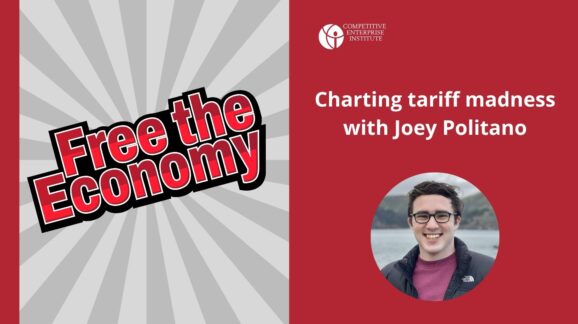There are two main areas in which Congress can enact meaningful reform. The first is to rein in regulatory guidance documents, which we refer to as “regulatory dark matter,” whereby agencies regulate through Federal Register notices, guidance documents, and other means outside standard rulemaking procedure. The second is to enact a series of reforms to increase agency transparency and accountability of all regulation and guidance. These include annual regulatory report cards for rulemaking agencies and regulatory cost estimates from the Office of Management and Budget for more than just a small subset of rules.
In 2019, President Trump signed two executive orders aimed at stopping the practice of agencies using guidance documents to effectively implement policy without going through the legally required notice and comment process.
Featured Posts

Blog
An executive order to make freedom mandatory
The White House Office of Management and Budget’s (OMB) new “Streamlining the Review of Regulatory Actions” memorandum signals a potentially transformative shift in Washington’s…

Blog
Free the Economy podcast: Charting tariff madness with Joey Politano
In this week’s episode we talk about changes in consumer credit, disappearing fast-food jobs in California, and six things the climate movement…

Forbes
Regulation Renovation: The Executive Order To Make Deregulation Permanent
The White House Office of Management and Budget’s new Streamlining the Review of Regulatory Actions memorandum signals a preferential stance toward deregulation, urging…
Search Posts
Blog
FACT Check the Internet’s Future
The Future of American Communications (FACT) working group funded by the Media Democracy Fund released its official report on the 26th of January. The report,…
Blog
We’re Here from the Government to Hurt You (the Toymakers)
That old line about “we’re here from the government to help you” always garners a laugh. But small toymakers are crying. Investigative columnist Timothy…
Blog
Unions Stall on EFCA, Advance Elsewhere
The Democratic Congress’s failure to pounce instantly to pass the so-called Employee Free Choice Act (EFCA), also known as the “card check” bill, presents a…
Blog
Obama Distorts Ledbetter v. Goodyear Case, In Signing Lilly Ledbetter Fair Pay Act
In signing his first bill into law, Obama didn’t let facts get in the way of a good story, or milking a political wedge issue.
Blog
COP, America’s Financial Paper Tiger
The Congressional Oversight Panel (COP) recently issued a report on the TARP. This report represents the second in a monthly series of reports to be…
Blog
That Was Fast: Stimulus Passes House
The House of Representatives has just passed the $800-billion stimulus package which President Obama hopes to make a centerpiece of his administration’s early economic…
Staff & Scholars

Clyde Wayne Crews
Fred L. Smith Fellow in Regulatory Studies
- Business and Government
- Consumer Freedom
- Deregulation

Ryan Young
Senior Economist
- Antitrust
- Business and Government
- Regulatory Reform

Fred L. Smith, Jr.
Founder; Chairman Emeritus
- Automobiles and Roads
- Aviation
- Business and Government

Sam Kazman
Counsel Emeritus
- Antitrust
- Automobiles and Roads
- Banking and Finance

Marlo Lewis, Jr.
Senior Fellow
- Climate
- Energy
- Energy and Environment